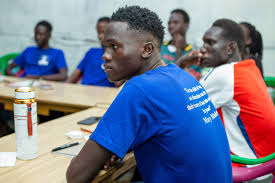Training Course on Leadership for Refugee and Displaced Student Support
Training Course on Leadership for Refugee and Displaced Student Support is designed to equip educational leaders, counselors, NGOs, and community advocates with the tools, strategies, and culturally responsive approaches required to support and empower refugee and displaced students.

Course Overview
Training Course on Leadership for Refugee and Displaced Student Support
Introduction
In a world increasingly affected by global conflicts, climate change, and socio-political instability, the number of refugee and displaced students continues to rise. Effective leadership in educational settings is essential for responding to the complex needs of these vulnerable learners. Training Course on Leadership for Refugee and Displaced Student Support is designed to equip educational leaders, counselors, NGOs, and community advocates with the tools, strategies, and culturally responsive approaches required to support and empower refugee and displaced students. With an emphasis on trauma-informed care, inclusive practices, and adaptive leadership, this training fosters the development of equitable learning environments that promote academic success, social integration, and long-term resilience.
By combining real-world case studies, evidence-based strategies, and expert insights, this course addresses the intersection of education, displacement, and leadership. Participants will explore key leadership frameworks, develop culturally sensitive policies, and gain practical skills for promoting mental wellness, academic continuity, and community engagement. Through interactive modules and scenario-based learning, trainees will emerge as change agents capable of transforming refugee education landscapes at local and global levels.
Course Objectives
- Understand trauma-informed leadership approaches for displaced learners.
- Identify the educational needs of refugee and asylum-seeking students.
- Build inclusive policies that foster belonging and safety in schools.
- Develop strategies for intercultural communication and engagement.
- Implement social-emotional learning (SEL) frameworks for refugee populations.
- Navigate the legal rights and protections of refugee students.
- Design community outreach programs for displaced families.
- Apply culturally responsive pedagogy to promote academic achievement.
- Foster collaborative leadership with NGOs and international agencies.
- Promote digital access and equity for displaced learners.
- Build resilience-based school leadership structures.
- Evaluate refugee education policies and best practices globally.
- Lead crisis-responsive education planning during displacement events.
Target Audiences
- School Principals and District Leaders
- Educational Counselors and Psychologists
- NGO Program Managers
- Refugee Camp Educators
- Government Education Officers
- Teacher Trainers and Coaches
- Social Workers in Education
- University Faculty and Researchers
Course Duration: 5 days
Course Modules
Module 1: Understanding the Refugee Experience in Education
- Introduction to global refugee education statistics
- The journey of displaced learners
- Barriers to access and inclusion
- The impact of trauma on learning
- Role of leadership in refugee student success
- Case Study: Syrian Refugee Students in Lebanese Public Schools
Module 2: Trauma-Informed Leadership in Schools
- Core principles of trauma-informed care
- Recognizing trauma symptoms in students
- Creating safe and predictable environments
- Leading with empathy and equity
- Staff training for trauma-sensitive classrooms
- Case Study: Implementing Trauma-Informed Practices in a U.S. Resettlement District
Module 3: Inclusive School Culture and Policy
- Developing anti-discrimination policies
- Building multicultural classrooms
- Parent and community inclusion strategies
- Creating safe spaces for expression
- School-wide equity audits
- Case Study: Canadian School Board’s Refugee Inclusion Model
Module 4: Social-Emotional Learning for Refugee Students
- Introduction to SEL competencies
- Adapting SEL curricula for displaced youth
- Addressing grief, loss, and identity
- Building student peer support systems
- Integrating SEL in classroom instruction
- Case Study: UNICEF’s SEL Pilot in Rohingya Refugee Camps
Module 5: Legal and Ethical Considerations
- International and national legal frameworks
- Rights of refugee children in education
- Ethical challenges in school registration
- Advocacy for undocumented learners
- Navigating school discipline for trauma-affected students
- Case Study: EU Policy Implementation in Refugee Access to Education
Module 6: Culturally Responsive Leadership
- Exploring cultural values and educational expectations
- Bias reduction and intercultural dialogue
- Leading with cultural humility
- Classroom strategies for multilingual learners
- Promoting global citizenship education
- Case Study: Kenyan Schools Supporting South Sudanese Refugees
Module 7: Partnerships and Community Engagement
- Stakeholder mapping and collaboration
- Working with local refugee-serving organizations
- Faith-based and community-based partnership models
- Parent engagement in resettled communities
- Shared leadership with refugee advocates
- Case Study: Ethiopian Community-Based Learning Hubs in Refugee Camps
Module 8: Innovation and Resilience in Crisis Education
- Using technology for displaced learners
- Mobile classrooms and distance learning tools
- Resilient school leadership in emergencies
- Rebuilding education post-displacement
- Planning continuity of learning amid crises
- Case Study: UNHCR’s Digital Classroom in Uganda Refugee Settlements
Training Methodology
- Interactive webinars and live sessions with experts in refugee education
- Scenario-based simulations to build decision-making and crisis-response skills
- Downloadable toolkits and customizable policy templates
- Breakout group discussions to foster peer learning and reflection
- Practical assignments and real-life applications
- Pre- and post-assessment surveys to measure learning outcomes
Register as a group from 3 participants for a Discount
Send us an email: info@datastatresearch.org or call +254724527104
Certification
Upon successful completion of this training, participants will be issued with a globally- recognized certificate.
Tailor-Made Course
We also offer tailor-made courses based on your needs.
Key Notes
a. The participant must be conversant with English.
b. Upon completion of training the participant will be issued with an Authorized Training Certificate
c. Course duration is flexible and the contents can be modified to fit any number of days.
d. The course fee includes facilitation training materials, 2 coffee breaks, buffet lunch and A Certificate upon successful completion of Training.
e. One-year post-training support Consultation and Coaching provided after the course.
f. Payment should be done at least a week before commence of the training, to DATASTAT CONSULTANCY LD account, as indicated in the invoice so as to enable us prepare better for you.